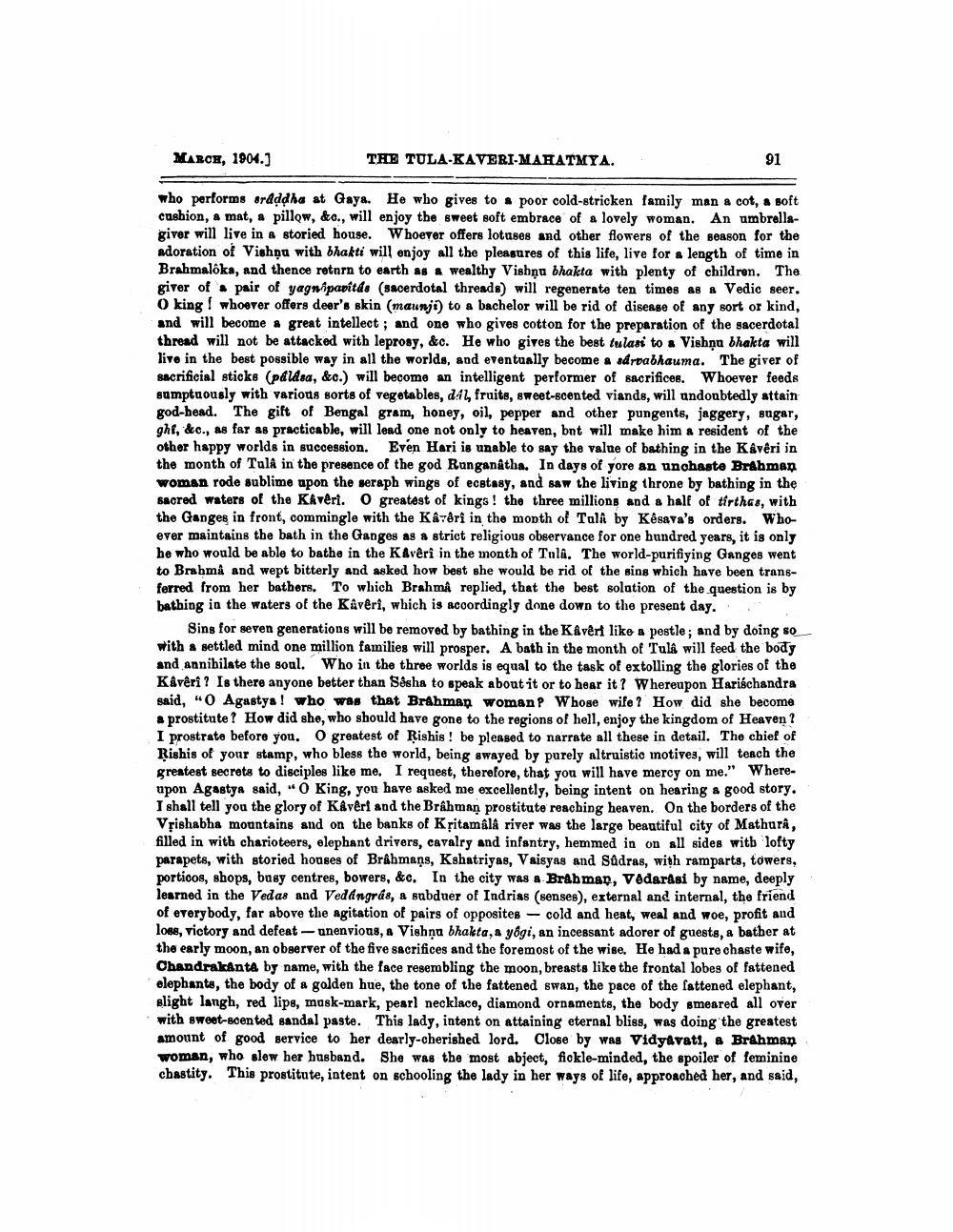________________
MARCH, 1904.)
THE TULA-KAVERI-MAHATMYA.
who performs sraddha at Gaya. He who gives to a poor cold-stricken family man a cot, a soft cushion, a mat, a pillow, &o., will enjoy the sweet soft embrace of a lovely woman. An umbrellagiver will live in a storied house. Whoever offers lotuses and other flowers of the season for the adoration of Vishņu with bhakti will enjoy all the pleasures of this life, live for a length of time in Brahmaloka, and thence retnrn to earth as a wealthy Vishnu bhakta with plenty of children. The giver of pair of yagnipapítás (sacerdotal threads) will regenerate ten times as a Vedic seer. O king I whoever offers deer's skin (maunjt) to a bachelor will be rid of disease of any sort or kind, and will become a great intellect; and one who gives cotton for the preparation of the sacerdotal thread will not be attacked with leprosy, &c. He who gives the best tulasi to Vishņu bhakta will live in the best possible way in all the worlds, and eventually become a sárdabhauma. The giver of sacrificial sticks (példsa, &c.) will become an intelligent performer of sacrifices. Whoever feeds sumptuously with various sorts of vegetables, 241, fruits, sweet-scented viande, will undoubtedly attain god-bead. The gift of Bengal gram, honey, oil, pepper and other pungents, jaggery, sugar, ghf, &c., as far as practicable, will lead one not only to heaven, but will make him a resident of the other happy worlds in succession. Even Hari is unable to say the value of bathing in the Kêvêri in the month of Tula in the presence of the god Ranganatha. In days of yore an unohaste Brahman woman rode sublime apon the seraph wings of ecstasy, and saw the living throne by bathing in the sacred waters of the Kaveri. O greatest of kings! the three millions and a half of tirthas, with the Ganges in front, commingle with the Kârâri in the month of Tala by Kesava's orders. Whoever maintains the bath in the Ganges as a strict religious observance for one hundred years, it is only he who would be able to bathe in the K&vêrî in the month of Tula. The world-purifiying Ganges went to Brahma and wept bitterly and asked how best she would be rid of the sins which have been transferred from her bathers. To which Brahmå replied, that the best solution of the question is by bathing in the waters of the Kávēri, which is accordingly done down to the present day.
Sing for seven generations will be removed by bathing in the K&vērt like a pestle; and by doing so with a settled mind one million families will prosper. A bath in the month of Tula will feed the body and annibilate the soul. Who in the three worlds is equal to the task of extolling the glories of the Kávêri? Is there anyone better than Sôsha to speak about it or to hear it? Whereupon Hariáchandra said, “0 Agastya! who was that Brahman woman? Whose wife? How did she become a prostitute? How did she, who should have gone to the regions of hell, enjoy the kingdom of Heaven? I prostrate before you. O greatest of Rishis ! be pleased to narrate all these in detail. The chief of Rishis of your stamp, who bless the world, being swayed by purely altruistic motives, will teach the greatest secrets to disciples like me. I request, therefore, that you will have mercy on me.” Whereupon Agastya said, “0 King, you have asked me excellently, being intent on hearing a good story. I shall tell you the glory of Kaveri and the Brahman prostitute reaching heaven. On the borders of the Vrishabha mountains and on the banks of Kșitamálå river was the large beautiful city of Mathurâ, filled in with charioteers, elephant drivers, cavalry and infantry, hemmed in on all sides witb lofty parapets, with storied houses of Brahmaņs, Kshatriyas, Vaisyas and Sadras, with ramparts, towers, porticos, shops, busy centres, bowers, &c. In the city was a Brabman, Vadarasi by name, deeply learned in the Vedas and Vedángrás, a subduer of Indrias (senses), external and internal, the friend of everybody, far above the agitation of pairs of opposites - cold and heat, weal and woe, profit and loss, victory and defeat - unenvious, a Vishņu bhakta, a yogi, an incessant adorer of guests, a bather at the early moon, an observer of the five sacrifices and the foremost of the wise. He had a pure chaste wife, Chandrakanta by name, with the face resembling the moon, breasts like the frontal lobes of fattened elephants, the body of a golden hue, the tone of the fattened swan, the pace of the fattened elephant, slight langh, red lipe, musk-mark, pearl necklace, diamond ornaments, the body smeared all over with sweet-soented sandal paste. This lady, intent on attaining eternal bliss, was doing the greatest amount of good service to her dearly-cherished lord. Close by was Vidyavati, a Brahman woman, who slow her husband. She was the most abject, fiokle-minded, the spoiler of feminine chastity. This prostitute, intent on schooling the lady in her ways of life, approached her, and said,




